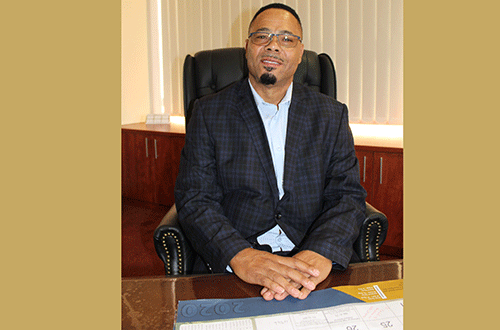Hardap governor Reverend Salomon April (SA) is a man on a mission, with big dreams for his region. As the country marks 31 years of independence, the governor engaged MICT’s Hilma Hashange on future developments and the potential that the region holds.
HH: As the first citizen of the region, during your first term in office, what is your vision for the region?
SA: I want to see a region that is self-sufficient and resilient to socio-economic challenges. My vision is that Hardap region becomes a food basket for Namibia and beyond I want to see scientists, engineers and other fields important for humanity to graduate from Hardap. I dream to see young and old people employed and create employment for themselves and others in this regard and I see tourism and agriculture as the main drivers of my vision. I dream to have all Hardap inhabitants to have comfortable housing; finally I dream of a non-tribalist society where tolerance for differences is upheld.
HH: Has the region attained any sort of tangible development since independence? If yes, please bullet key developments.
SA: Post-independence period is characterised by both challenges and achievements amidst socio-economic and changing political dynamics.
The government has delivered immensely in terms of land allocation particularly in reference to farming land, furthermore, land for urban/business and housing purposes were also delivered to a satisfactory degree.
This could be expedited if resources are teamed and coordinated for better results. Areas such as housing, municipality services, employment, education, medical and security and safety services are delivered on an ongoing basis. Roads infrastructure, government office infrastructure and both rural and urban electricity infrastructure coupled with availability of those services are tangible but need to be improved on.
HH: What are your views on the progress the region has achieved since the country gained independence?
SA: The biggest achievement is the governance structure; Namibia migrated from apartheid to democracy hence the apartheid governance structure was devoid of the important regimes of governance in a democracy. Inception of regional and local government infrastructure is laudable because it brings government closer to the people. Consultative and or participator governance was achieved.
I therefore urge responsible entities for development to continue to consult and allow citizens to participate in their development. The key tenant of democracy is participation; therefore, I believe the people must participate in projected interventions meant for their development.
My word of advice, never should we as a nation gauge development on the perception of the people but we should by all means work to gauge development on the impact it has on their daily lives.
HH: What are the main challenges faced by the people of this region? And what is planned to overcome these challenges?
SA: Unemployment is high and is the direct attributable fact of poverty and hunger. I have also learnt that we have a huge backlog with respect to education which is because of the high dropout rate of secondary school learners, and the parents’ inability to pay for tertiary and further studies of those kids wishing to do so. Crime is another area of concern; stock theft and crimes against women are disturbingly obtrusive as is the case elsewhere in our country. Alcohol consumption is also another area of concern.
We will have to reinforce the fight against gender-based violence through sensitisation and through talks through printed and electronic media to change the cultural belief that the woman is an object that is owned by the male counterparts.
The planned projects with respect to green economy and green fuel are aimed at creating jobs that will reduce poverty which is the origin of all evil.
There are plans for starting up a scheme similar to the food bank where we forestall to receive livestock from donors and keep them at a farm exclusively for raising the numbers, improving the quality for redistribution to needy people in the region to encourage animal husbandry.
People have lost numbers of animals and need assistance with restocking. Other interventions pertain to aggressive advocacy and veering towards agriculture which is the strong economic activity in this region to address food insecurity; to this end, WFP and other UN and local organisations are already on the ground to ensure food security through the invitation and facilitation of the governor’s office.
We have also started to talk to different players to look into areas of decent housing and education as well as solar energy because we are adamant that timeous intervention in these identified areas will consolidate peace and stability and would allow less competitive but more supportive and tolerant co-existence in Hardap region.
HH: What are the investment and socio-economic development opportunities in Hardap that are yet to be explored?
SA: Hardap region has a vast spectrum of opportunities that it can offer for investment. Such opportunities cut across all the sectors such as tourism, agriculture, solar energy and retail businesses just to mention a few. Of late we have also started to invest in the conservation of wildlife and the environment by the creation of conservancies – even in that space there is huge potential for investment.
HH: Any other related information.
SA: I wish to congratulate Namibia and its people on this independence celebration day to celebrate achievements and to continue to cherish the culture and attitude for unity and progressive nation-building.


